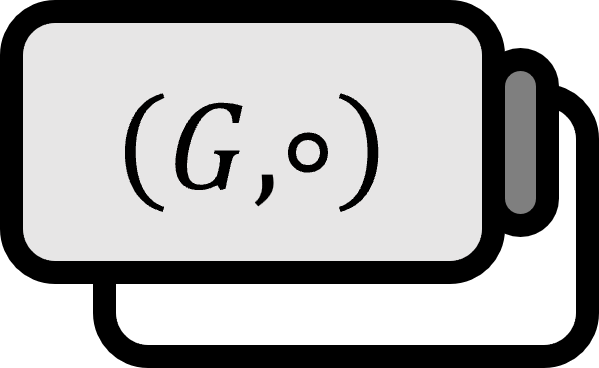Vector Spaces in Abstract Algebra
Definition 1
If all $\alpha , \beta \in F$ and $x, y \in V$ of the set $F$ and Abelian group $V$ satisfy the following conditions, then $V$ is called a vector space over $F$. The elements of $F$ are called scalars, and the elements of $V$ are called vectors.
- (i): $\alpha x \in V$
- (ii): $\alpha ( \beta x) = ( \alpha \beta ) x$
- (iii): $\left( \alpha + \beta \right) x = \alpha x + \beta x$
- (iv): $\alpha (x + y) = \alpha x + \alpha y$
- (v): $1 x = x$
For a index set $I$, let us denote some subset $M \subset V$ of $V$ as $M := \left\{ x_{i} \right\}_{i \in I}$.
- For some $\left\{ \alpha_{i} \right\}_{ i \in I} \subset F$, we call $\displaystyle \sum_{i \in I} \alpha_{i} x_{i}$ a linear combination of $\left\{ x_{i} \right\}_{i \in I}$.
- If for every $\left\{ x_{i} \right\}_{i \in I}$, the only case satisfying $\displaystyle \sum_{i \in I} \alpha_{i} x_{i} = 0$ is $\alpha_{i} = 0 , \forall i \in I$, then $\left\{ x_{i} \right\}_{i \in I}$ is said to be linearly independent of $F$. Otherwise, it is called linearly dependent.
- If every element of $V$ can be expressed as a linear combination of $M$, then $M$ is said to span $V$, and it is denoted as $\text{span} M = V$.
- If $M$ is linearly independent when $\text{span} M = V$ holds, then $M$ is called a basis for $V$ over $F$.
- If there exists $M$ that satisfies $\text{span} M = V$ for a finite set $I$, then $V$ is said to be finite dimensional.
- When the basis of the finite-dimensional vector space $V$ is $M$, the cardinality of $M$ is called the dimension of $V$ over $F$, and it is denoted as $\dim V$.
Explanation
The concept is usually familiar from linear algebra, with the name ‘algebra’. It can also be explained as an abstract algebra. A simple example is the ring of polynomial functions $\mathbb{R} [ x ]$, which can easily be seen as a vector space with a basis of $1 , x , \cdots , x^{n}$.
See Also
The $F$-vector space mentioned in the documents below is essentially no different from the vector spaces in these documents. However, the perspective differs slightly: a vector space in linear algebra is an abstraction of the intuitive Euclidean space, while a vector space in abstract algebra can be seen as bringing that idea into a true ‘algebra’.
Conversely, the $R$-module generalizes the scalar field $F$ of a $F$-vector space to a scalar ring $R$. Thus it shows its identity with a name indifferent to the history and significance of the $F$-vector space. From the standpoint of the group $G$, the ring $R$ and the new operation $\mu$ are added, so its Chinese translation is module.
Fraleigh. (2003). A first course in abstract algebra(7th Edition): p274~280. ↩︎
